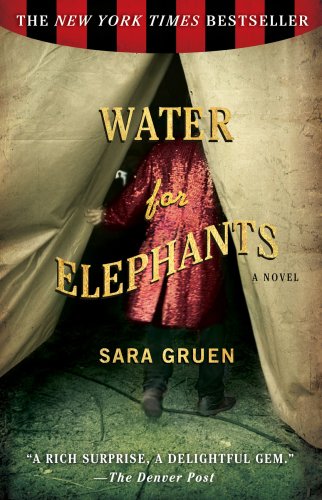Hmmmm. This is going to be a tough book to review, but I'll do my best.
Ian McEwan's
Atonement is a much-celebrated novel that was made into an even-more-celebrated film in 2007. I knew of the film, due to its wide critical acclaim in the award season following its release, but had not seen it before reading the book.
The book begins in pre-World War II England and is centered around the well-to-do Tallis family. There's the always absent workaholic father whose name I don't even remember, and Emily, the mother who is such a poor motherly figure that her children call her by her first name. There are three Tallis children -- Leon, Cecilia, and Briony. Briony is a brilliantly talented writer, even at the young age of twelve, with a very active imagination. So, when she "accidentally" witnesses a couple of awkward, flirtatious situations between her sister, Ceclia, and Robbie Turner (the son of the Tallis family's live-in help), Briony lets her imagination twist the situation into something that it isn't. Later in the novel, a young cousin of the Tallis' is raped. Briony's mind is so skewed that she aides the police investigation with some false information. Obviously, false accusations can easily ruin lives... So the rest of the book is about Briony dealing with her own guilt and seeking
atonement (see what they did there?) from those she has wronged.
I should also add that there is a layer of (what appears to be) self-critiquing in this novel by McEwan himself. He uses Briony's writing to discuss the struggles of authors and the guilt associated with "playing God" and determining your characters' fates... Blah, blah, I don't really like all that abstract, introspective crap, so I'm not going to discuss it in the review, although I thought I should mention it so that no one thinks I'm an idiot who just didn't notice it. I did; I just don't care.
Let me start by saying that I think McEwan is a terrific writer. Really, he's got beautiful phrasing, and he's very good at playing out emotions. The novel itself lagged in a few places, but overall, the pace was good. I enjoyed
reading the novel, but I did not enjoy the actual novel itself. That doesn't seem like it makes sense, but, as I have said many times -- the ending of a novel will make or break it. In this case, it wasn't really just the ending, but... maybe the lack of an ending? I mean, it ended, but it was utterly pointless. I kept waiting on some giant secret revelation that was going to crack the whole book wide open, but it never came. The latter parts of the novel cover about ten years, and I thought surely something was going to come of all those words on all those pages, but... No. Maybe I'm completely crazy, because there are tons of people who
rave about this book, but I felt like I wasted my time. I realize that all books don't have to have a happy ending where all the lose ends are tied -- in fact, I prefer books that aren't like that -- but this one just didn't work for me.
Now...
I'm about to say something I do not ever, ever,
ever say, and I will probably never say it again, so prepare yourselves.
Are you ready?
OK.
The movie is so, so much better than the book.
..............Bleh, that leaves a terrible taste in my mouth. But it's true. The film stays very,
very close to the plot of the book with only a few minor changes, so it doesn't make up for anything that's wrong with the book. Same plot, same ending, same everything. But somehow, it is a beautiful movie. That's so strange to me, but it's true. Joe Wright, the director, must be some sort of cinematic genius. I have never seen a movie directed so well. I don't want to turn this into a movie review but I do want to say this:
One of my biggest issues with books-turned-to-movies is that you often lose the sense of perspective that you get from being inside different characters heads.
Atonement brilliantly worked around this by using a specific cue (e.g. a close-up of a doorknob turning) to signal the beginning of an important event (e.g. the first time Briony witnesses Robbie and Ceclia's flirtation). You watch it from Briony's perspective. Then the movie returns to that same cue and goes through the event from Ceclia's perspective. It's not that clean-cut, but you get the idea. Really well done. For once in my
life, I am telling you to watch a movie but skip the book. I must be going crazy.
Read from November 28, 2011 to December 21, 2011
2/5 Stars
--C

